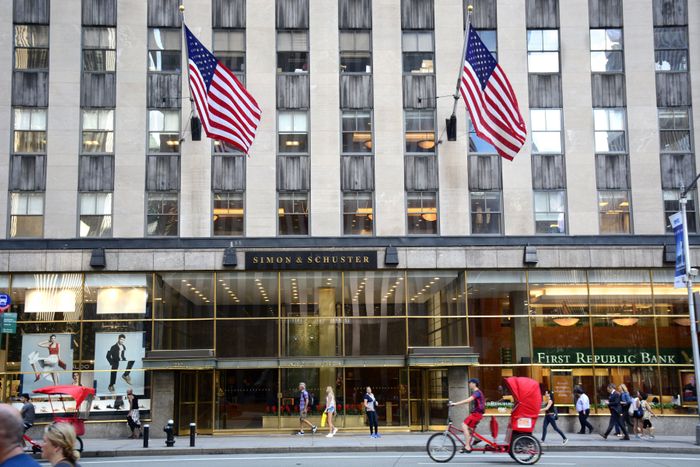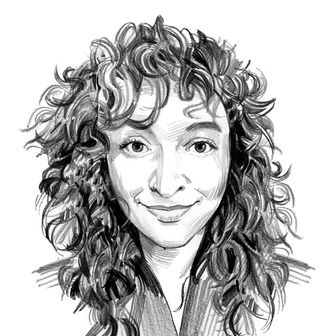
For three weeks, the Department of Justice fought Penguin Random House and Simon & Schuster in a federal antitrust trial over the publishing giants’ proposed $2 billion merger. The DOJ argued that a Penguin Random House–Simon & Schuster merger — which would cut the industry’s so-called Big Five publishing houses (Penguin Random House, Hachette, HarperCollins, Simon & Schuster, and Macmillan) down to four — would hurt authors by limiting their leverage. “This merger will end that competition which benefits authors, and authors will earn less money for what they write,” Justice Department attorney John Read said Friday, August 19, in his closing argument, according to Publishers Weekly. “We brought this case because the best protection for authors is robust competition. This is not about the passion of publishers for books and authors; this is about the largest publisher, Penguin Random House, cementing its position at the top of the market.” The trial has dramatic implications for the U.S. publishing industry, and the proceedings have provided insight into a largely opaque world. There were witnesses such as best-selling author Stephen King and publishing executives including Penguin Random House CEO Markus Dohle. Their testimony made public how things like author compensation and publishers’ competition for best sellers play out in this seemingly unregulated business.
Penguin Random House’s defense repeatedly criticized the Justice Department’s focus on authors who land advances greater than $250,000, as the department was using this number to illustrate how a merger would harm writers. “I enjoyed listening to Stephen King,” Penguin Random House attorney Dan Petrocelli reportedly said in his closing argument. “But no one is disputing his earnings. There are writers in this market who are billionaires. I mean, Stephen King could buy Simon & Schuster.” He argued that focusing on authors with advances greater than $250,000 was a “false market” given that there are very few people in this category. “The only reason we are here is because the government has created artificial concentration to create artificial harm.” (While focusing its case on authors with advances topping $250,000 — about 2 percent of authors — the government recognized that most of the remaining 98 percent sold fewer than 2,000 copies, according to journalist Alex Shephard, contending that “the existence of so many books with negligible sales” didn’t negate the potential harm of a merger.) According to Publishers Weekly, Simon & Schuster attorney Stephen Fishbein said the company agreed to merge with Bertelsmann, Penguin Random House’s parent company, because it “offered the best price. We also believe that the deal will benefit S&S authors.” The judge in this case, Florence Y. Pan, is reportedly expected to issue a decision on the case this fall. Vulture spoke with experts and observers about how they think the trial went.
Both sides seemed to put up a good fight, but …
Legal experts and observers told Vulture that lawyers for all sides seemed to present strong cases. However, some thought that the Department of Justice’s case came across as more persuasive. “The judge made clear that she thought that both sides presented their cases well and were well represented,” said one source who closely followed the proceedings, but “I think one case came out stronger. I believe the Department of Justice is going to prevail.” This source noted a few examples of why they believed this to be the case. “Fairly early on in the trial, we saw Judge Pan interjecting herself rather assertively, at first just to gather information, although over time, I think she made fairly clear that she was inclined to accept many of the government’s arguments — particularly in the final week of testimony.” The source pointed to Pan seeming to side with the government’s economic expert over that of the defense. Pan also decided to exclude the defense’s evidence on merger-related efficiency. The defense had wanted to use the “efficiencies model” to show that a merger wasn’t anticompetitive but that it somehow makes things more competitive for authors and boosts their earnings. “Without that evidence being admitted, there was no clear pro-competitive case left for the defense to make,” the source said. (Notably, some of the discussion about efficiencies included “headcount reductions,” according to Publishers Weekly.)
Craig Seebald, a partner at Vinson and Elkins who leads the firm’s global Antitrust Group, said that Simon & Schuster and Penguin Random House had a steeper hill to climb given how big their merged company would be. “It seems like the DOJ has done a very good job of putting its case together,” Seebald said, noting that the Justice Department’s case “seems like it’s very focused on the harm to others.” Simon & Schuster and Penguin Random House “have some challenges” given what their merger would mean for the market. If the merger went through, the Big Five would turn into the Big Four. The Justice Department argued that this conglomerate would control more than 50 percent of the U.S. publishing market. “That’s a tough thing for the merging parties to defend.” Seebald pointed to the publishers not being able to use their efficiency expert as a potential challenge for them. “I just think the facts are harder for the merging parties.”
It’s hard to get a read on the judge.
“I truly haven’t seen anything that indicates which way she’s going. She seemed like a very fair judge, one that’s really rolling up her sleeves and putting in the time,” Seebald said. Peter J. Glennon, a business and employment litigator and principal of the Glennon Law Firm, said that the judge’s inquiries might suggest which issues she’s weighing but not necessarily where she falls on them. “What I have read is that the judge was posing very direct, factual questions with which the leaders of the various publishing houses tended to agree.” Glennon pointed to reporting on Pan’s seeming interest in mid-list authors and whether publishers treat them as well as they do their mega-sellers. (According to the Associated Press, Pan questioned Simon & Schuster CEO Jonathan Karp about whether mid-list writers get lots of attention; he admitted that blue-chip authors get treated in a special way, saying, “If you really love the book, you have to jump through hoops.”) “She’s asked these direct questions for clarification, and in my experience, when you have the judge asking those factual questions, it does suggest what they may be thinking,” Glennon said. “You don’t necessarily know what they’re thinking about that topic or how the answers to their questions fit into the total analysis. Could it be harmless that she asked if a mid-list author is really a low-level author who nobody is competing for?” Glennon continued. “That could have just been clarification,” but it could suggest, he says, that she was thinking, “Maybe the DOJ does have a point here.” John Maher, a Vulture contributor who covered part of the trial for Publishers Weekly, highlighted Pan’s questioning of Brian Tart, publisher and president of Penguin Books, about projected profits and losses with books. “She asked, ‘P&Ls are fake? They don’t mean anything?’ And Tart said, ‘Yeah, we don’t really know if we’re right,” Maher said, paraphrasing Pan’s exchange with Tart. “That was the point at which I realized that the judge was understanding some of the quirks of the book business while also rightfully eye-rolling them or just aware that this a business that is as both sides portray it in the trial.”
There could be major implications for labor.
Remember when Stephen King introduced himself as a “freelance writer” when he testified as the government’s star witness? As funny as that might have sounded — King is a freelance writer, yes, but he has quite a different life than virtually every other freelance writer on earth — it touches on how this trial could affect creative workers. Diana L. Moss, president of the American Antitrust Institute, wrote in an email to Vulture, “This book publisher merger case focuses on how the merger of Penguin/Simon & Schuster would create a dominant firm that will eliminate competition in publishing rights, to the detriment of writers. A merged Penguin/Simon & Schuster would be a more powerful buyer of book publishing rights. The firm would likely exercise this enhanced market power by lowering advances to authors. Consumers of leading books will ultimately feel the consequences of this harm.” Moss, who was speaking generally of the case but not specifically about the trial, said this was a unique case compared to other antitrust actions given its focus on labor. “Antitrust enforcers have, to date, not focused on mergers and anticompetitive practices that harm workers. Rather, they have focused on mergers that directly harm consumers,” Moss wrote. “But many markets are dominated by powerful buyers that exercise substantial market power, as we see in food and agriculture and healthcare — and now here in publishing.”
It all comes down to the competition.
Although the court’s decision could have important implications for publishing and labor, Pan has to make it based on the law, not how she feels about things. Since it’s an antitrust case, this means she will be weighing legal issues surrounding competition. “A judge will always be considering the ramifications of a particular decision, but here this judge is being asked to apply credible facts, as she determines them, about this trial to federal antitrust law,” Glennon said. “While she might think of the impact, she’s not the one who gets to decide whether that impact is good or not, positive or negative. I think that this judge will be analyzing the laws to see if this merger, as presented to her, truly harms competition in this industry.” While a Penguin Random House–Simon & Schuster merger would inevitably result in industry consolidation, it’s unclear how these proceedings will affect what the New York Times and others have described as “the elephant in the room” — Amazon’s alleged monopoly over the bookselling industry.
* A previous version of this article misidentified Dan Petrocelli as Bill Petrocelli.


